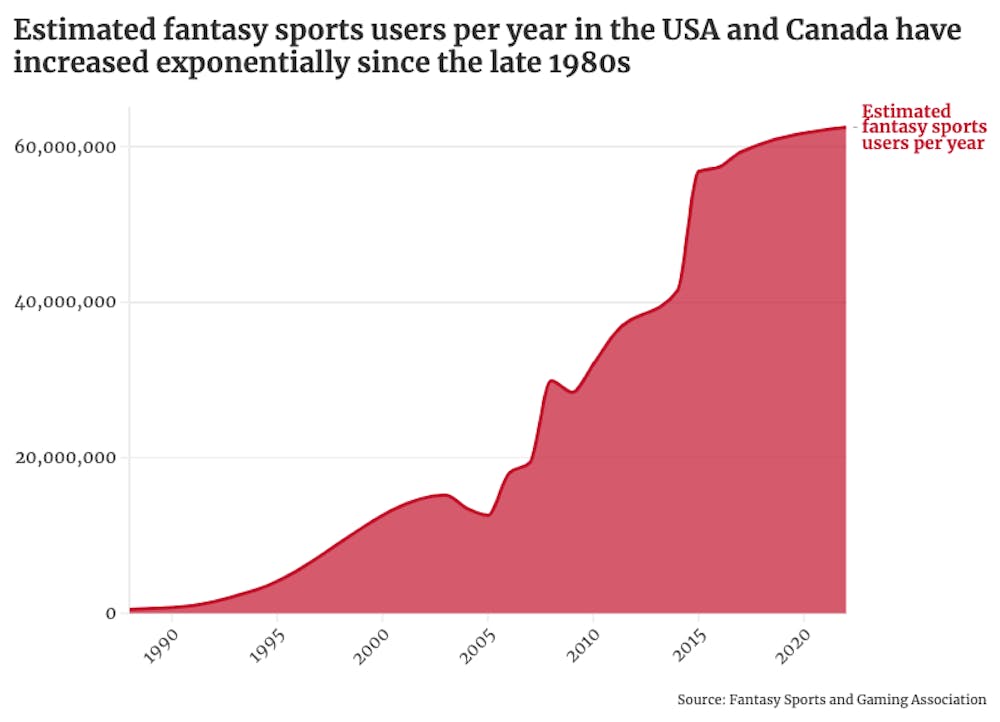This past June, the Ohio Casino Control Commission (OCCC) opened an investigation into several daily fantasy sports websites. These websites, including Lucra Sports and Dynasty Owner, offer individual player vs. house wagers similar to those found on sportsbooks.
This case has reopened the debate on whether fantasy sports are considered sports gambling, and whether they should be regulated in the same manner.
Legally, fantasy sports aren’t considered gambling. Current regulations for fantasy sports providers and sports betting providers are different. Fantasy sports regulations allow 18-year-olds to participate, while sports gambling regulations require participants to be 21 or older.
Miami University Sports Leadership and Management (SLAM) professor Brody Ruihley has been researching the fantasy sports industry for years to answer questions like these. In his book “The Fantasy Sport Industry: Games within Games,” Ruihley describes the history of fantasy sports and its future development.
Fantasy sports first emerged in the 1960s. Baseball was the first sport to have a fantasy community, as the sport dealt with a lot of statistics. An early example of fantasy baseball is Strat-O-Matic, a tabletop game that awards points based on the results of an athlete’s real-life statistics. These early versions of fantasy sports needed to be done in-person, and scores needed to be calculated by hand or with a spreadsheet.
“Baseball was the first entry into fantasy sports for me,” Ruihley said. “I had a friend in high school who had a fantasy baseball league that we would do every year, even going into college. I also had a family friend who did a kitchen table draft. I’ve kept those two leagues for about 20 years now.”
While fantasy sports had a culture throughout the late 20th century, it wasn’t until the introduction of the internet in the late 1990s and early 2000s that it really jumped in popularity. According to the Fantasy Sports & Gaming Association (FGSA), between 1 and 3 million people participated in fantasy sports between 1991 and 1994. In 2003, that figure rose to 15.2 million people. Ruihley found that this increase in popularity was largely due to the accessibility provided by the Internet.
“When the internet exploded, it allowed players to have fantasy leagues that weren’t limited to the people you knew around you,” Ruihley said. “You could have online leagues with digitized stats. With the internet, there was finally an environment for fantasy leagues to blossom.”
Today, the big providers for fantasy leagues include ESPN, Yahoo, CBS, DraftKings and FanDuel. At first, there was a negative stereotype surrounding fantasy sports which discouraged these large media providers from creating a platform. Fantasy sports players were thought to be a niche, nerdy group of sports consumers. In the early 1990s, players relied on small columns such as Baseball Weekly for daily and weekly statistics, and the industry was never promoted by a large company.
Eventually, ESPN found that fantasy players consumed significantly more sports content than non-fantasy players. After this realization, Matthew Berry and John Diver started to create a fantasy sports platform at ESPN. In 2006, Berry started two shows at ESPN, “Fantasy Insider” and “Fantasy Football Now,” which provided fantasy football analytics on Sunday mornings. The success of these shows proved that there was demand for televised fantasy content.
Ruihley says that football is the perfect model for fantasy sports.
“It’s bite-sized compared to other sports,” Ruihley said. “You can watch it a little on Thursday, a lot on Sunday, and a little on Monday. It’s perfect for fantasy because you don’t have to devote your entire week to it.”
Enjoy what you're reading?
Signup for our newsletter
In baseball, basketball and hockey, teams play every day of the week. Additionally, the season lasts significantly longer than the NFL season, so fantasy leagues for these sports become a longer time-commitment than fantasy football.
Throughout the 2010s, the popularity of fantasy sports continued to increase, reaching 62.5 million users in 2022 according to the FGSA. In the same time period, sports gambling shot up in popularity starting in 2018, when the previous federal ruling banning it was ruled unconstitutional. For many, sports gambling offers an alternative form of entertainment for sports, though Ruihley believes that it won’t replace fantasy sports altogether.
“Sports betting may reduce daily fantasy participation,” Ruihley said, “but traditional season-long fantasy is widely different. I think that fantasy is the gateway into sports betting. I think that people were doing daily fantasy because they couldn’t legally gamble yet.”
As states are starting to adjust to new sports gambling legislation, the impact on fantasy sports has yet to be seen. From his research, Ruihley believes that fantasy sports will continue to thrive.
Concern with the future of fantasy sports lies in the fact that the lines between daily fantasy and sports gambling are blurring. The recent OCCC investigation shows that fantasy websites are starting to adopt similar practices to sports gambling websites.
But still, there will always be a market for fantasy sports. It’s a fun way to compete and keep up with friends. The lows are painful, but the highs are so worth chasing. Anyone who has ever won a league can attest to the satisfaction.




